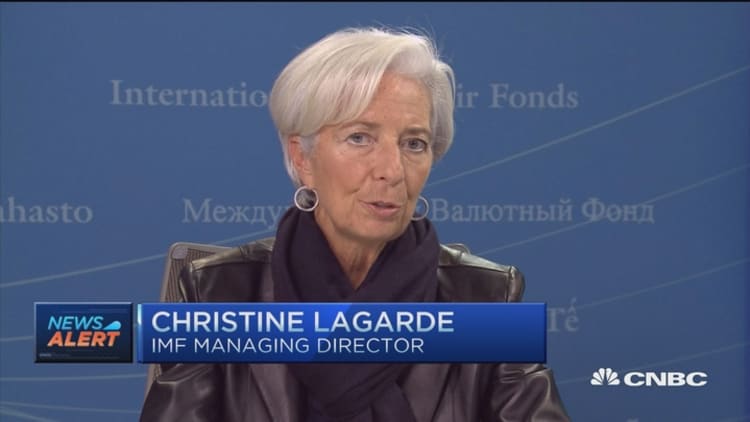The International Monetary Fund has urged the world's leading economies to join forces and take bold action in a bid to boost growth, highlighting concerns that global market turbulence is starting to hurt the real economy.
The fund's clarion call for action came ahead of Friday's gathering of G20 finance ministers and central bank governors from the world's leading advanced and emerging economies in Shanghai. It also coincided with another day of turmoil in financial markets driven by a further collapse in the oil price after Saudi Arabia damped hopes of a co-ordinated cut in crude production.
The IMF on Wednesday warned the G20 participants in a briefing note that global growth this year was already worse than expected as financial conditions tighten in advanced economies due to market ructions. It also pointed to the rising stress in emerging economies and the increasingly acute situation facing oil producers in the developing world, many of which have already run through their fiscal buffers.
"These developments point to higher risks of a derailed recovery, at a moment when the global economy is highly vulnerable to adverse shocks," the IMF warned.

"The global economy needs bold multilateral actions to boost growth and contain risk," it added. "The G20 must plan now for co-ordinated demand support using available fiscal space to boost public investment and complement structural reforms."
However, the G20 finance ministers already appear unlikely to live up to the IMF's expectations when they meet this week. Jack Lew, the US Treasury secretary, on Wednesday played down the likelihood of an emergency response by the G20 even as he called for China to do more to boost domestic consumption and for surplus countries in Europe such as Germany to do more fiscal stimulus.
"These last few months have made clear that weakness in demand globally is a problem that can't be solved just by everyone looking to the United States," he told Bloomberg TV.
More from The Financial Times:
S&P warns of Asia's corporate repayment risk
US 2016 presidential election race by numbers
Trump sees clearer path to Republican nomination
In many cases, Mr Lew insisted, real economies were doing better than financial markets thought. "This is not a moment of crisis," he said. "Don't expect a crisis response in a non-crisis environment."
Much of the focus in Shanghai is expected to be on the host, with Chinese authorities under pressure to be more transparent about currency reforms and reassure the world that they are not setting out to devalue the renminbi to boost growth. But China has in recent days dismissed the idea of the G20 agreeing on a co-ordinated plan on currencies and growth akin to the 1985 Plaza Accord.
The IMF did not lower its global growth forecast of 3.4 per cent for this year — which was revised downward in January — but warned that a downgrade was "likely" when it next publishes forecasts in April.
The IMF said G20 economies needed to use all of the tools available, but it put particular emphasis on the need for greater fiscal stimulus where possible.
"On the demand side, accommodative monetary policy remains essential where inflation is still well below central banks' targets. However, a comprehensive approach is needed to reduce over-reliance on monetary policy. In particular, near-term fiscal policy should be more supportive where appropriate and provided there is fiscal space," the fund said.
It also rapped the G20 on the wrists for falling behind on a commitment made in 2013 to boost global growth by an extra 2 per cent by 2018 with the measures implemented so far by countries likely to add only 0.8 per cent to growth by that deadline. Given the weak state of the global economy, the G20 also needed to discuss expanding that goal, the fund said.
"Strong action is needed to achieve full implementation of the G20 growth strategies across countries now," the IMF said. Doing so "would provide a significant boost to the global economy at a critical moment".


